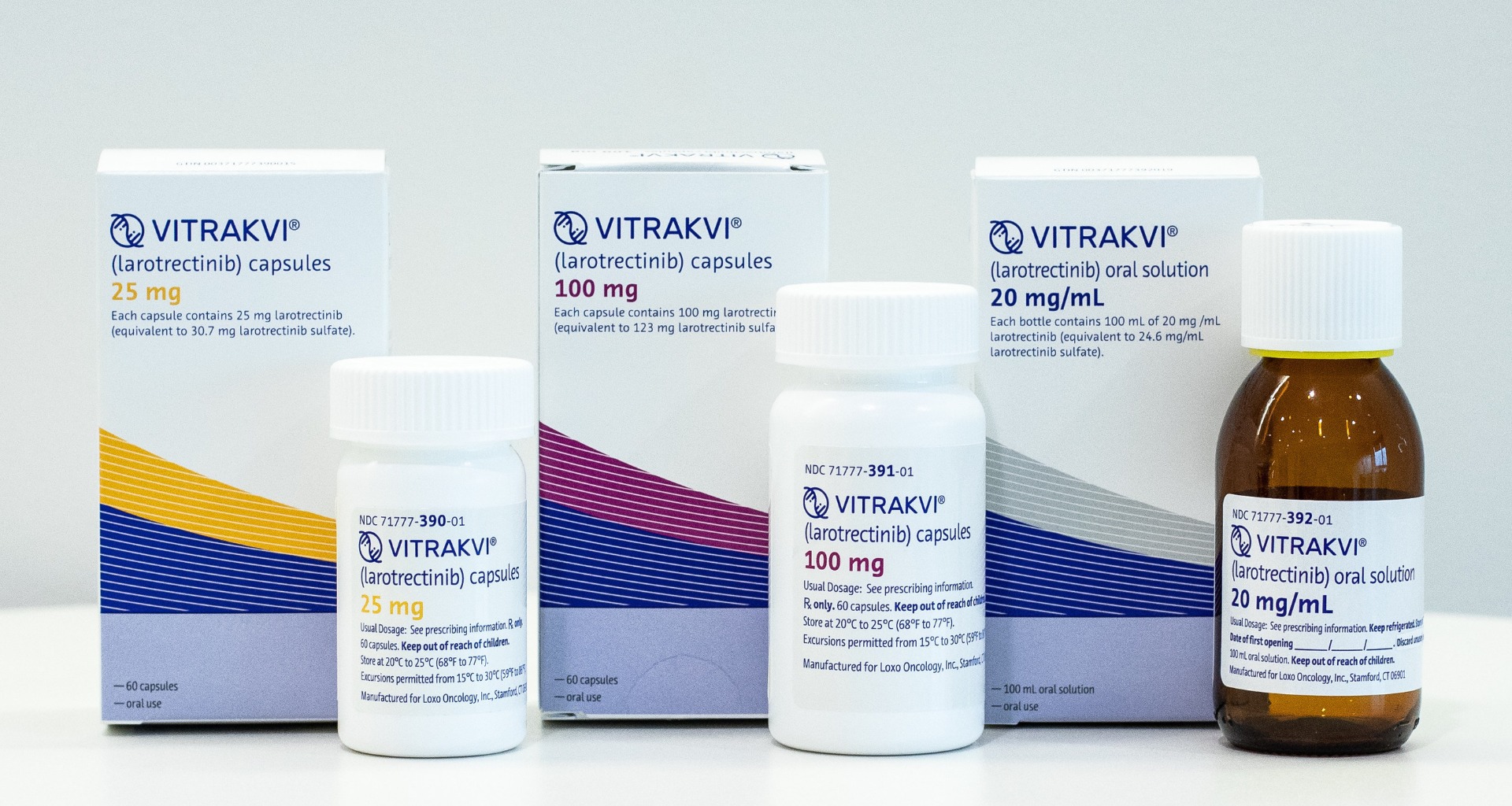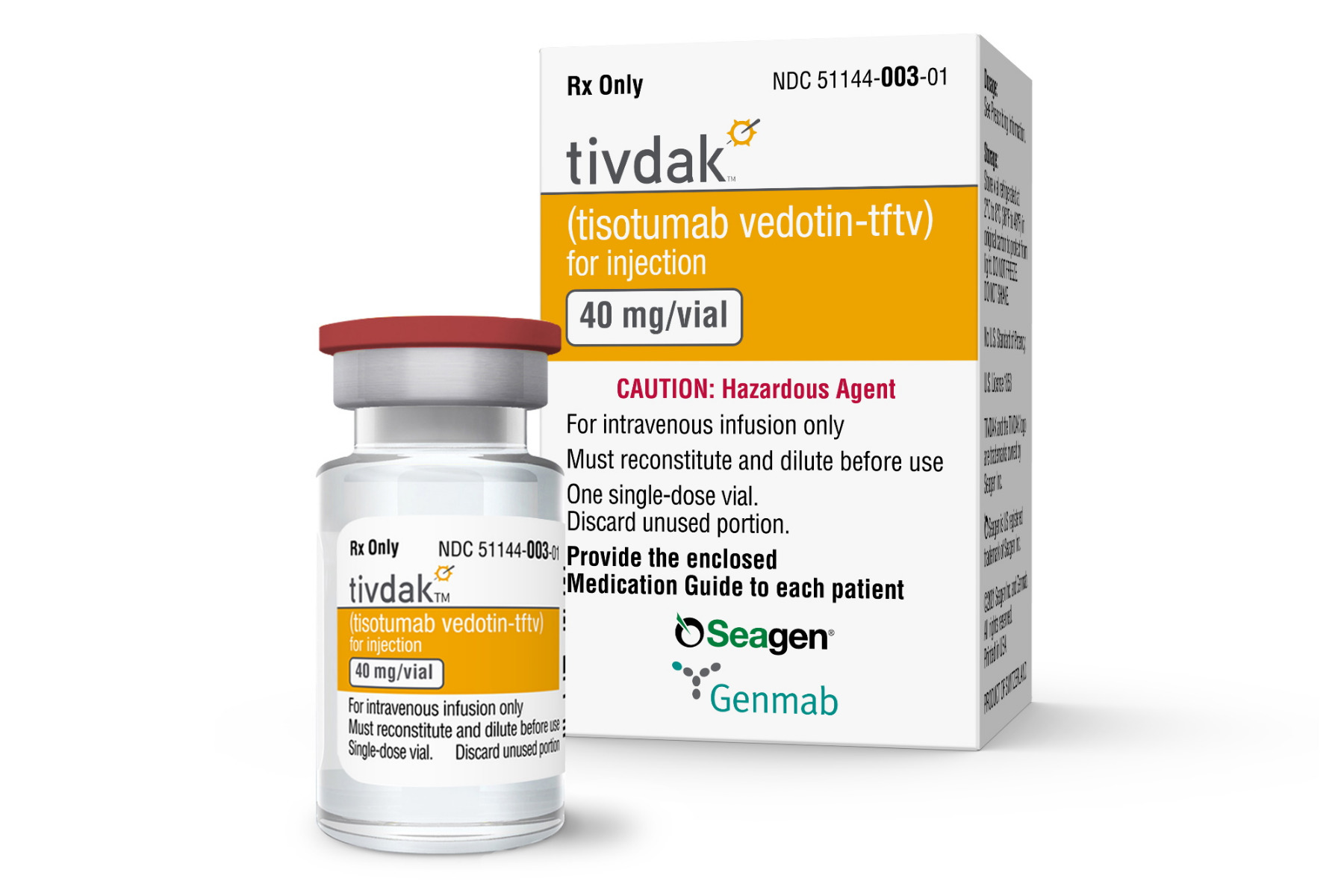Vitrakvi (larotrectinib) vs Tivdak (tisotumab vedotin-tftv)
Vitrakvi (larotrectinib) vs Tivdak (tisotumab vedotin-tftv)
Vitrakvi (larotrectinib) is a targeted therapy specifically designed to treat solid tumors with a neurotrophic receptor tyrosine kinase (NTRK) gene fusion, regardless of the tumor's location in the body, and is effective in patients who have this specific genetic marker. Tivdak (tisotumab vedotin-tftv) is an antibody-drug conjugate used for the treatment of recurrent or metastatic cervical cancer with disease progression on or after chemotherapy, targeting tissue factor-expressing cells and delivering a cytotoxic agent directly to the tumor. When deciding between these two medications, it is crucial to consider the specific type of cancer and its genetic profile, as Vitrakvi is chosen for its targeted action on NTRK gene fusions, while Tivdak is specifically indicated for certain types of cervical cancer, highlighting the importance of personalized medicine based on individual tumor characteristics.
Difference between Vitrakvi and Tivdak
| Metric | Vitrakvi (larotrectinib) | Tivdak (tisotumab vedotin-tftv) |
|---|---|---|
| Generic name | Larotrectinib | Tisotumab vedotin-tftv |
| Indications | For the treatment of adult and pediatric patients with solid tumors that have a neurotrophic receptor tyrosine kinase (NTRK) gene fusion | For the treatment of adult patients with recurrent or metastatic cervical cancer with disease progression on or after chemotherapy |
| Mechanism of action | Selective tropomyosin receptor kinase (TRK) inhibitor | Antibody-drug conjugate targeting tissue factor |
| Brand names | Vitrakvi | Tivdak |
| Administrative route | Oral | Intravenous |
| Side effects | Fatigue, nausea, dizziness, vomiting, increased liver enzymes, cough | Peripheral neuropathy, nausea, fatigue, alopecia, epistaxis, conjunctivitis |
| Contraindications | None known | None known |
| Drug class | TRK inhibitor | Antibody-drug conjugate |
| Manufacturer | Bayer | Seagen Inc. and Genmab |
Efficacy
Vitrakvi (Larotrectinib) Efficacy in Treating Solid Tumors
Vitrakvi, also known by its generic name larotrectinib, is a medication designed to treat solid tumors in a specific subset of patients. Its efficacy is particularly notable in individuals whose tumors have a specific genetic feature known as a neurotrophic tyrosine receptor kinase (NTRK) gene fusion. These fusions are rare but can occur in various types of solid tumors, including lung, thyroid, melanoma, gastrointestinal, and other tumors. Larotrectinib is a targeted therapy that works by inhibiting the kinase activity of the TRK fusion proteins, thereby impeding tumor cell growth and survival.
Clinical trials have demonstrated the effectiveness of Vitrakvi in patients with solid tumors harboring an NTRK gene fusion. The drug has shown high response rates, with a significant proportion of patients experiencing tumor shrinkage. This response is also durable, with many patients maintaining their response over time. The efficacy of larotrectinib has led to its approval by regulatory agencies for the treatment of solid tumors with NTRK gene fusions, regardless of the tumor's original location in the body.
Tivdak (Tisotumab Vedotin-tftv) Efficacy in Treating Solid Tumors
Tivdak, with the generic name tisotumab vedotin-tftv, is another medication used in the treatment of solid tumors, specifically indicated for the treatment of recurrent or metastatic cervical cancer. Tivdak is an antibody-drug conjugate that combines an antibody targeting tissue factor (TF), a protein frequently overexpressed in many solid tumors, with a cytotoxic agent. Once Tivdak binds to the TF on the cancer cells, the cytotoxic agent is released inside the cells, leading to cell death.
The efficacy of Tivdak in solid tumors has been evaluated through clinical trials in patients with recurrent or metastatic cervical cancer who have previously undergone chemotherapy. The results have shown a meaningful proportion of patients achieving partial or complete responses to the treatment. The median duration of response and progression-free survival have been considered clinically significant, leading to the approval of Tivdak for the treatment of advanced cervical cancer by health authorities. While its use in other solid tumors is still being investigated, Tivdak represents a promising option for patients with limited treatment alternatives.
Regulatory Agency Approvals
Vitrakvi
-
European Medical Agency (EMA), European Union

-
Food and Drug Administration (FDA), USA

-
Health Canada

-
Pharmaceuticals and Medical Devices Agency (PMDA), Japan

Tivdak
-
Food and Drug Administration (FDA), USA

Access Vitrakvi or Tivdak today
If Vitrakvi or Tivdak are not approved or available in your country (e.g. due to supply issues), you can access them via Everyone.org.
How it works

Make an enquiry
Choose the medicine you want to buy, answer a couple of questions, and upload your prescription to speed things up. We’ll get back to you within 24 hours.


Make an enquiry
Choose the medicine you want to buy, answer a couple of questions, and upload your prescription to speed things up. We’ll get back to you within 24 hours.


Breeze through the paperwork
We'll guide you through the required documents for importing unapproved medicine, ensuring you have all the necessary information.


Get a personalized quote
We’ll prepare a quote for you, including medicine costs and any shipping, administrative, or import fees that may apply.


Receive your medicine
Accept the quote and we’ll handle the rest - sourcing and safely delivering your medicine.

Some text on this page has been automatically generated. Speak to your physician before you start a new treatment or medication.
Let's talk
If you have any questions, call us or send us a message through WhatsApp or email:
Contact us




